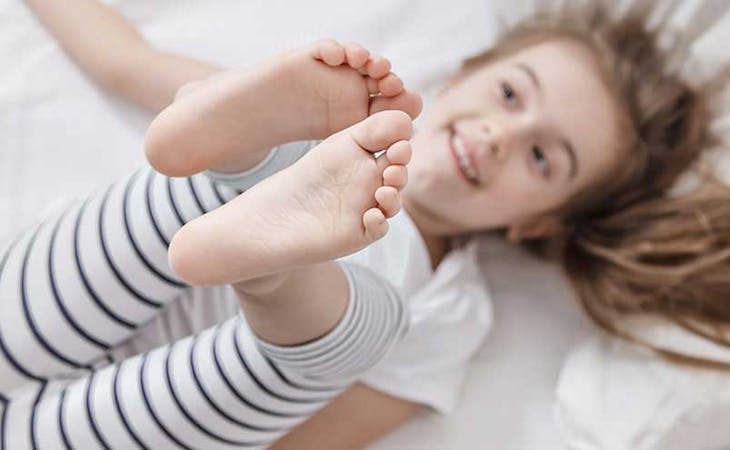Many adults jokingly refer to growing pains as a natural part of childhood—but until your kids are waking you up in tears every night, you probably don’t think too much about them.
How concerned should you be about growing pains, though—and will you (and your achy child) ever sleep again? Here, an expert in taking care of growing bodies breaks down all the need-to-know info about growing pains in kids—and how to keep them from wrecking your family’s rest.
What are growing pains, exactly?
Typically, what we refer to as “growing pains” are “severe muscle cramps, aching, and throbbing that kids experience during the night,” says pediatric chiropractor Anna Saylor. They’re most common in kids ages six to nine—and though these pains can affect the upper body, most kids complain of growing pains in their legs. (According to research published in Pediatric Rheumatology, up to 37% of children experience growing pains at some point.)
First things first: No, growing pains are not actually a direct result of a child’s growing body. “Growing should not hurt,” says Saylor. In fact, the cause of what we know as growing pains is rather unexpected. “We typically see these issues when a kid’s pelvis is out of alignment,” Saylor explains.
A childhood full of trips, falls, tumbling around, and playing often involves countless impacts on a child’s lower back and pelvis. The more out-of-alignment this part of the body is, the more pressure lying down in bed puts on their low back and pelvis, says Saylor. This pressure affects the nerves that run through the lower back and down the legs, and as a result, the lower body can tense up and spasm—and cause your little one to wake up in serious pain.
“Have you ever been woken up by a leg cramp so bad that you couldn’t move your toes?” Saylor asks. “That’s what these pains feel like; kids just often don’t know how to describe them.”
How growing pains mess with sleep
As any parent of a child dealing with growing pains knows, the discomfort not only impacts your child’s sleep but the sleep of pretty much everyone in the house.
“Some kids wake up every night crying in pain—and then take a good half-hour or so to calm down and fall back asleep,” says Saylor. “A kid might go months without any issues and then have a streak of experiencing these pains every single night,” Saylor says.
During these bouts, children often feel extra-tired during the day, which further stresses their already out-of-balance bodies and increases the likelihood that they’ll continue to have overnight pain. Research suggests it can also affect their participation in school and recreational activities.
Related: A sleep coach’s 5-step plan for getting your kids to sleep
Easing growing pains—and reclaiming your family’s sleep
If growing pains are keeping your child (and you) up at night, Saylor recommends seeing a pediatric chiropractor, who can make a series of gentle adjustments to the lower back and pelvis to get their growing body back in alignment.
However, a few helpful at-home tricks can also help ease their pain and normalize your family’s sleep schedule. In addition to making sure your growing kid is well-hydrated (and consuming plenty of electrolytes—minerals that help support muscle and nerve function), Saylor also recommends nightly Epsom salt baths.
“Add an Epsom salt blend that contains lavender, which is known to be soothing, to the tub and have your child soak for five to 10 minutes,” she says. It’s an easy addition to a bedtime routine that helps soothe a child’s body and mind for bed.
Growing pains—or a more serious issue?
Typically, kids who have growing pains during the night don’t experience any other symptoms, like swelling or redness, Saylor says.
“If a child is waking up during the night with growing pains but not dealing with any other issues, we’re usually able to get them back to their normal, pain-free routine in a couple of weeks,” she explains.
If that doesn’t do the trick—or your child has pain that affects their daily quality of life—it’s time to make an appointment with an orthopedist to investigate whether there’s a more serious injury at play.
The right mattress can help ensure your child gets the support they need while they sleep. Here’s exactly what to look for in a kids’ mattress.





